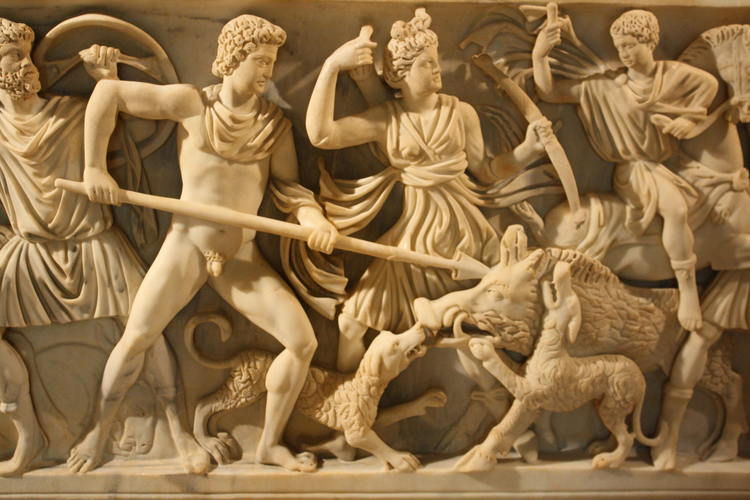The Most Sensible Knight
- Gatharion
- Nov 1, 2018
- 4 min read

Art by F.A. Fraser
Sir Dinadan (or Dynadan and possibly from the Welsh Dynod) is my most favorite of the Knights of the Round Table because of his sensible nature that makes him so incongruous in comparison to all of the other knights. He juxtaposes especially well with Sir Tristan (or Tristram) with whom he was good friends.
Their friendship did not begin easily, though. Dinadan was sent by King Arthur to invite Tristan to Camelot and immediately during their journey they meet a lady who entreats them to battle 30 knights sent by Morgan le Fay. Sir Dinadan's response is along the lines of "Are you f*ing nuts?! We can't fight 30 knights!" A righteously angry and oh-so stalwart Sir Tristan insists that they go forward and says "I ask you only to kill one knight, or if that is too much, then stand by and watch." He considers Dinadan a coward and the contempt is palatable. Not especially caring what Tristan thinks, Dinadan promises only to watch and defend himself if necessary. However, whether because he ends up inspired by Tristan's valor or simply because as a chivalrous knight he couldn't bear to watch one man face such odds, Dinadan does wade into the fray and acquits himself well defeating eight of their foes. (Tristan defeats 12 and the rest flee.)
Later as the two knights seek lodging they are told of a nearby castle where they can stay, but only if they first defeat the knights that guard the gate. Unlike a traditional hero of lore who answers such a challenge without question, Dinadan responds to the notion that he must first fight for his room with "To the devil with it! I shall not lodge there!" Naturally, Tristan calls him a coward and insists that they go forward with it. "Alas, that I ever fell into your company!" rejoins Sir Dinadan. (Welcome to the Ramada, you can have your room key if you can beat up our security guard Biff and take it from him!) These narrative devices that are taken for granted in traditional hero tales are viewed with modern, and far more relatable, sensibilities by Dinadan.
After a few more adventures (and misadventures) a bond forms between the two and Dinadan's pragmatism takes on a more sympathetic angle as he assuages Tristan's anger after one of Tristan's rare defeats.
"Sir Tristan, there was never a man so great that he never failed, nor so wise that he was never made a fool of, nor so good a horseman that he never had a fall."
The contrast between the two is also manifest in how Sir Tristan is a classic example of the love-lorn hero, ever pining for his beloved Iseult who was married to his uncle King Mark of Cornwall. When Tristan asks Dinadan if he is a lover himself, Dinadan replies with "No! God forbid that I should meddle in that game."
Although, he was not one taken with what he viewed as the foolish notion of the romantic 'chaste amor', Sir Dinadan was known as a poet and minstrel. While he had many victories (and his share of defeats) whilst on adventure or on the tournament grounds, Sir Dinidan's greatest accomplishment was not a feat of arms, but one of wits.
Following a letter sent by King Mark intended to sow discord at Camelot, Sir Dinidan remarks to the court:
"'King Mark is well known for his treachery, hence no one will take his insinuations too seriously. To reply courteously would be a waste of courtesy; therefore I shall compose a lampoon and teach it to the minstrels at the court, and that shall be our reply to him.'
Sir Dinidan composed his lampoon. It was excellent, and told of King Mark's treachery and cowardice since the beginning of his reign. King Arthur and Queen Gwynevere were delighted with it, and it was taught to all their minstrels, who were then given instructions to sing it throughout the realm, and especially in Cornwall."
After this Dinidan is still recognized as a formidable combatant, but above all as one of the great wits of the land and his opponents feared his barbed tongue more than the tip of his lance.
Ultimately we are presented with a knight who can fight, and fight well even, but rarely does battle when he sees no reason for it*, has a pragmatic view of life, loss, and love, and can recognize the power of a well-placed word. *There are multiple instances of Dinidan being challenged to jousts and just saying the equivalent of "nah, bro"; an attitude completely at odds with how his peers are presented.
Despite all this, he is not without the self-sacrificing impulse that so often marks the popular notion of heroism. During an early adventure, Sir Tristan was grievously wounded, but hellbent on chasing down another knight despite his wound. Worried that Tristan was dying and with tears in his eyes, Sir Dinidan said to his new-found friend, "Sir Tristan, you are seriously wounded and you must not fight. I will encounter Sir Palomides and do what I can. If he kills me, pray for my soul; but in the meantime withdraw to the safety of a castle."
It's a moment that holds more gravitas coming from this sensible knight that Tristan had initially called a coward then it would if it had come from a Sir Lancelot or Sir Gawain, one of those more traditionally heroic figures.
Quotations taken from Le Morte d'Arthur by Sir Thomas Malory. Rendered into modern idiom by Keith Baines copyright Bramhall House 1962.



Comments